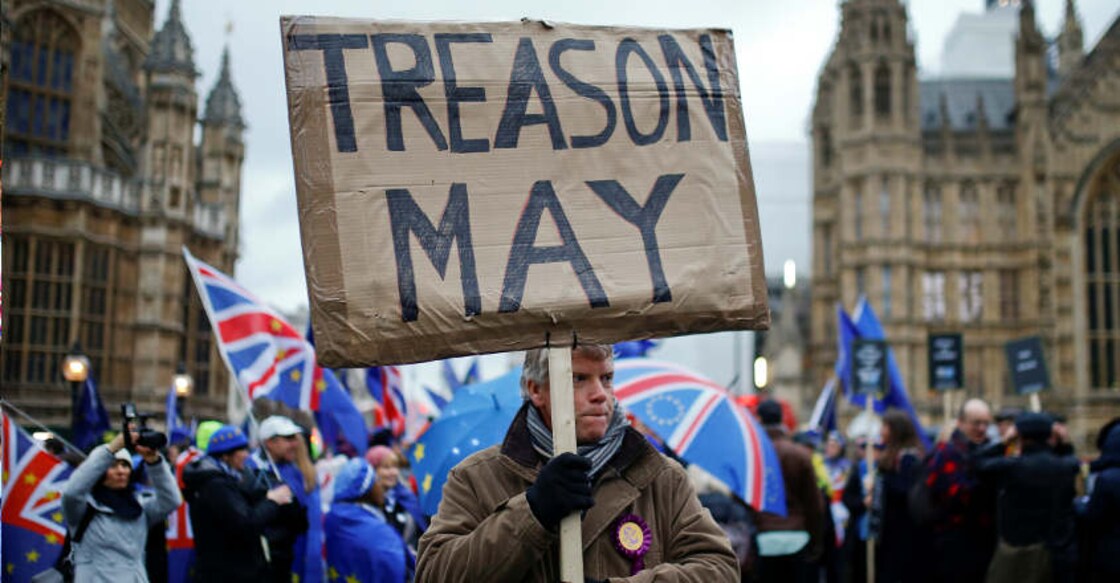May's Brexit deal voted down: What will happen now?

Mail This Article
With the British parliament rejecting the Prime Minister Teresa May’s painstakingly drafted British exit (Brexit) deal for leaving the European Union (EU), the government has been plunged into an immediate crisis with the Opposition Leader Jeremy Corbin tabling a no-confidence motion.
The parliament will discuss the no-confidence motion on Wednesday.
May’s plan was voted down with a majority of 230 votes, with only 202 voting in support of the deal that spells out the conditions for Britain’s decision to exit from the European Union taken following a nation-wide referendum taken on June 23, 2016. A total of 432 members voted against May’s deal including 118 members from her own Conservative Party. Only 196 members from the Conservatives supported May, while three members from the opposition Labour Party as well as three independents also stood with her.
Following the referendum, the proceedings for Britain to leave the EU as stipulated in Article 50 of the Lisbon Treaty were initiated on March 29, 2019. According to these proceedings, Britain will cease to be a part of the EU on March 29, 2019, which leaves just 73 days. The UK and the EU countries had been working out the withdrawal agreement charting out the details of the exit. The deal was supposed to chart out the status of the UK citizens living in the EU countries and how much money the UK will have to pay for leaving.
What will happen now ?
Five possibilities are being considered while discussing the immediate future of Brexit and the British government now.
1. Reconsiderations and negotiations
If Teresa May manages to tide over the no-confidence motion, the government will get three more days to hold renegotiations and come up with new suggestions. May has promised that the alternate suggestions could be tabled next Monday (January 21). May is hopeful that though more than 100 members of her own party had voted to defeat the Brexit deal, they would support her in fighting the no-confidence motion. If that happens, the government will not fall and renegotiations could be held.
2. New government

In case the no-confidence motion wins and May is forced to resign, a new government may come to power with new leadership. This government could initiate the reconsiderations and renegotiations. Or, they could conduct a second referendum.
3. General election
If the no-confidence motion manages to force the present government out and yet no new government could be formed, then fresh polls may be expected. The proceedings for the elections would need at least five weeks.
4. Second referendum
The 2016 referendum had given only a narrow margin to Brexit. Many of the officials and the public had later expressed their opinion that a pro-Brexit stance was taken rather impulsively. It is widely believed that a second referendum may actually vote against Brexit. The possibilities for a second referendum are high in case of the formation of a new government on May’s exit or in case of a new Government getting formed following elections. With the second referendum expected to be against Brexit, it may be possible for Britain to escape from the complications.
5. No deal exit
The last possibility would be a no-deal exit for Britain from the EU. However, this is feared to result in total chaos as the conditions for trade and diplomatic relationships between Britain and the EU countries would remain undefined. The prospects of travel would also be greatly affected.
Is Britain really out ?
Will the Brexit cease to exist with the deal getting defeated in the Parliament? Or, will Brexit continue to be a reality ? These are natural doubts that would spring to mind.
Any country that initiates the proceedings under Article 50 of Lisbon Treaty to leave EU will be automatically out of the EU on completion of two years since the initiation of the proceedings. As per this rule, Britain, whose Article 50 proceedings were initiated on March 29, 2017, will cease to be a part of the EU at 11 p.m. British Time on March 29, 2019. It cannot be reverted.
However, in the light of the current crisis, Britain could ask for extending of the deadline, which could be ratified by the EU. It is expected that under the present circumstances, the EU may give an extension of the deadline without much hitch.
It is also pointed out that Britain still has the possibilities to revert the Brexit. The EU leadership had already dropped hints that the time for rethinking is not yet out. Even though there are member countries that are against any recalling of the exiting member, in case Britain takes a decision to revert the Brexit, that might be universally accepted.
However, under the present circumstances only 73 days remain for Britain to sever ties with the EU.
Read more: Latest World news

